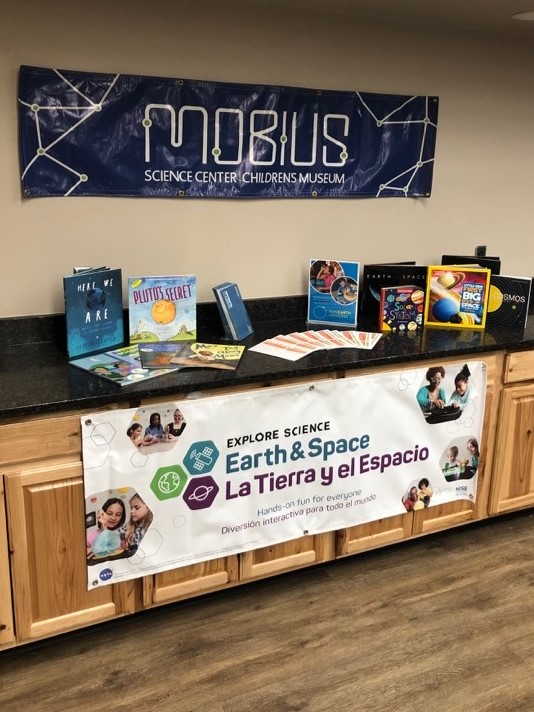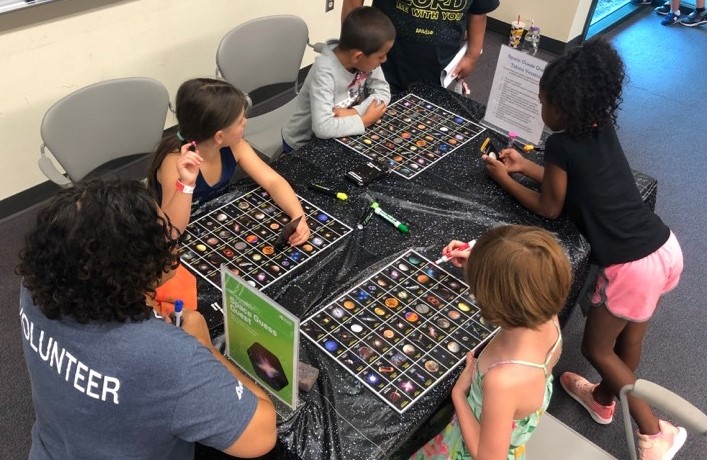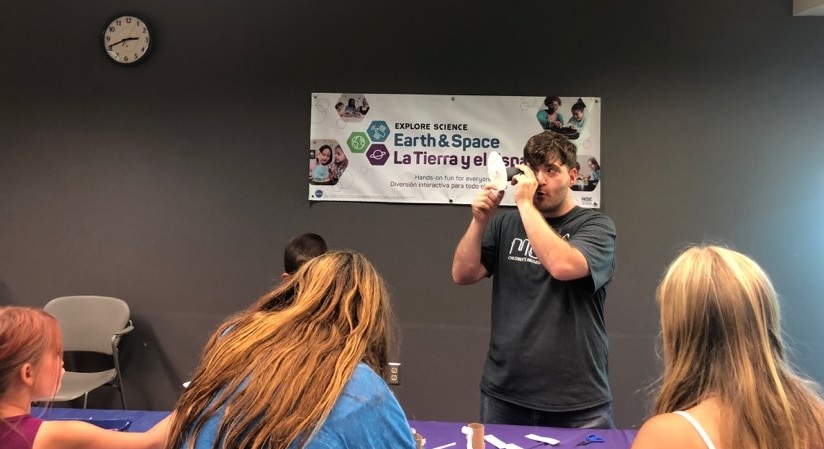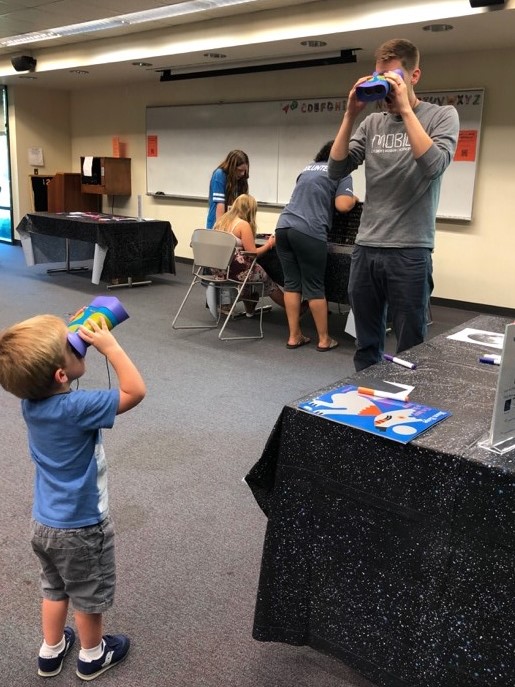Mobius Children’s Museum & Science Center (http://www.mobiusspokane.org/) operates two different locations in downtown Spokane, WA, serving a large geographic area in Eastern Washington and Northern Idaho, both rural and urban communities. Our two, connected locations provide a unique continuum of experiential learning to create lifelong learners at all ages with outreach education programs that focus on bringing hands-on STEM to our community. One such example is the Community Summer Library Program (CSLP - https://www.cslpreads.org/) hosted by regional libraries.
In support of the nation-wide summer library program, A Universe of Stories, we were excited to celebrate the 50th Anniversary of the Apollo 11 mission with the Explore Science: Earth & Space toolkit activities. In the past, Mobius has created programming that fits the CSLP theme from a science approach, and this summer we were eager to facilitate this very inspiring topic using such great hands-on materials at 24 different community library events.
We had several requests for our mobile planetarium and wanted to create a program where families had plenty to do while waiting for a planetarium show. Since the Children’s Museum is such a large part of our DNA, we also wanted kids to have a STEAM craft that they could take home at the end of the day. CSLP is geared toward elementary-aged readers, though experience proves that guests come eager to learn at all ages. So, we looked for toolkits that could be adapted for various ages and handle large groups: Hide & Seek Moon, Bear’s Shadow, Filtered Light, Pocket Solar System, Space Guess Quest, and Molecules in Motion (an Explore Science: Let’s Do Chemistry kit activity with a great space lesson embedded).
Mobius needed more staff than usual to facilitate this many activities and the planetarium, so we recruited the help of budding science teachers from Eastern Washington University’s (EWU) College of STEM. Training was provided using the NISE Network's toolkit resources and online workshops. Their willingness to learn new things and engage with these learners did not go unnoticed.
One local librarian explained that these volunteers were, “great at prompting the children to think scientifically (asking good questions that got the children to observe and experiment and answering questions with ‘why do you think that is?’ to promote critical thinking). But they were also knowledgeable. Both are important to fostering a good educational environment, and they handled that well.”
The 2-hour, drop-in library program allowed families to participate in three or more STEM activities and (where available) enjoy a 10-minute planetarium show. Families would spend anywhere from 15 minutes to over an hour engaging with the activities and our staff, consistently leaving with a sense of awe about our universe. Similarly, adult caregivers left the events having learned something about space and were in awe of their young learners. In addition to the Explore Science toolkits, activities were adapted from My Sky Tonight (https://astrosociety.org/education-outreach/early-learners/my-sky-tonight.html) and STEM Clearinghouse (http://clearinghouse.starnetlibraries.org/). The connections to Moonbear’s Shadow and Moon Rope storybooks were an incredibly valuable addition to the activities for pre-K visitors. Even the youngest visitors (0-3 years old) were able to learn through play and helped older siblings with activities.
One mother visiting a Spokane Public Library location was so impressed that her son was engaged and answering questions about the Moon and the Sun. She shared that she had been nervous about her son starting Kindergarten in the fall, but this experience gave her confidence in the year ahead. Parents and caregivers often come to summer library programs to combat that dreaded “slump” in summer learning. Our staff and volunteers wanted to bring authentic science and engineering so that visitors could make observations and reason through problems. We learned a lot throughout the summer, but we owe a lot to NISE Net partners who offered resources and expertise in programming for young learners, with conversations and planning for the summer beginning as far back as the February NISE Network Partner Meeting.
By the end of the summer, we had seen 1950 visitors across 24 library events, which was a 20% increase in attendance from the previous summer. Not only did our attendance increase, but our goal of more visitor participation increased, as well.
Previous summers featured a science show format with demonstrations where one or two kids were invited to “assist” with an activity; overall, not a lot of visitor participation. This summer, we very rarely had kids decline to participate in an activity - they were excited to get involved.
With the help of NISE Network programs and resources, Mobius was able to focus on delivering a great program all summer. We could not have done this without the support of our EWU volunteers, who gave 200.25 hours of their time this summer. We are always excited to adapt the NISE toolkits to various themes, and we look forward to next summer in our regional libraries when the theme will be “Imagine Your Story.”
Special thanks to: Eastern Washington University, Community Library Network (ID), East Bonner County Library District (ID), Spokane County Library District, and Spokane Public Libraries. The impact on our communities was definitely a team effort! And to Keliann LaConte of Space Science Institute and Anna Hurst of Astronomical Society for the Pacific for your input during the webinar last spring and the many resources your organizations have created!





